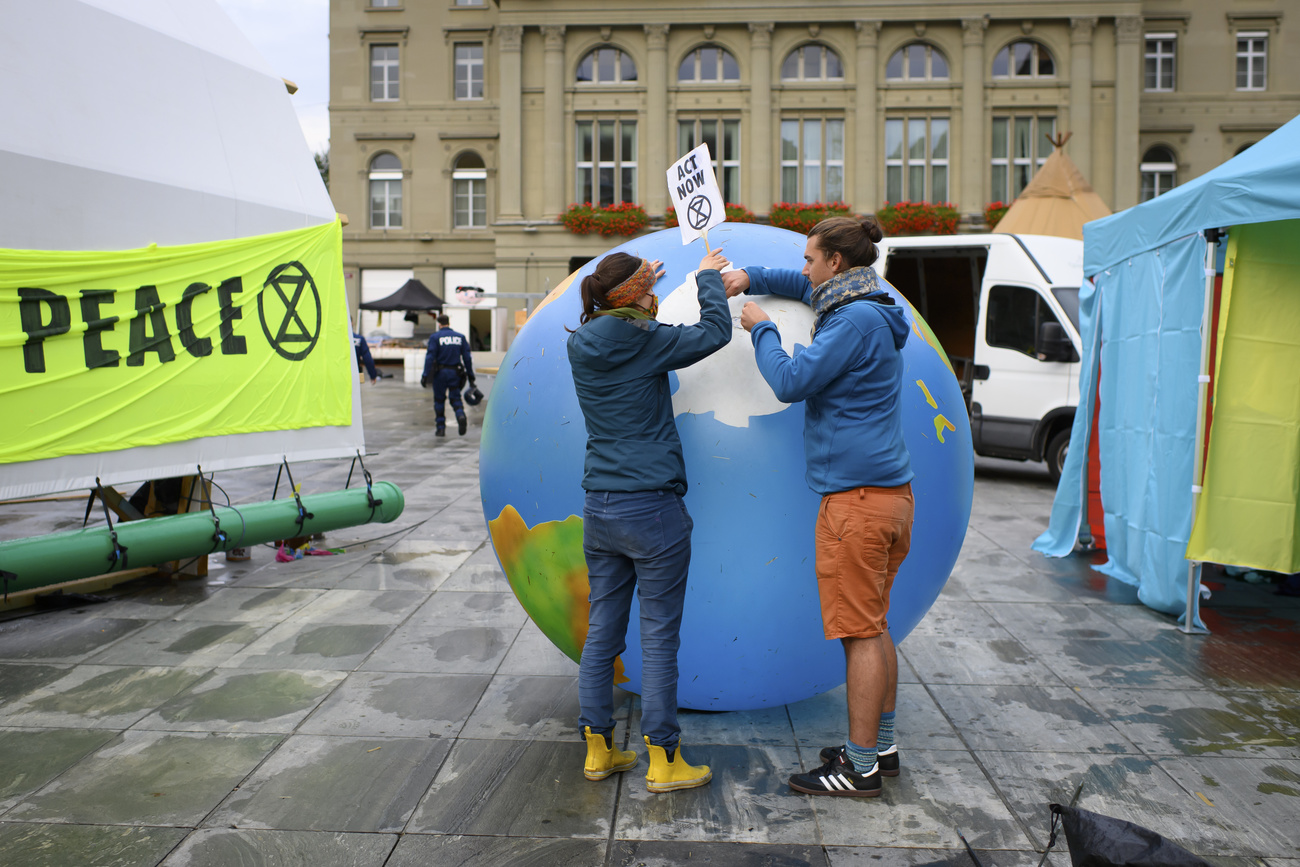Swiss climate strategy to be decided at the ballot box

On June 13, Swiss voters will have the last word on a key pillar of the country’s climate change strategy – the “CO2 law”, which has divided both business and activists.
One crisis shouldn’t overshadow another, warn associations, politicians, and young people across the world – in other words, the coronavirus shouldn’t distract from a problem whose repercussions could be even more serious and lasting: climate change.
Global greenhouse gas emissions fell in 2020, along with the slowdown in economic activity. But they are again on the rise. And the target of capping global temperature increases at 2℃ seems more and more distant, unless fast and decisive action is taken.
In Switzerland, such action will be decided at the ballot box on June 13, when citizens go to the polls to decide on the revised national CO2 law.

More
Swiss CO2 emissions: Small country, big footprint
What’s at stake?
The CO2 law is the main political instrument at the national level for achieving the country’s emissions objectives. Within the framework of the Paris Climate Agreement, Switzerland has committed to cutting greenhouse emissions by half by 2030, in comparison to 1990 levels. The long-term goal is to become climate neutral by 2050.
To translate these goals into legislation and to determine what concretely needs to be done over the next decade, a wide-ranging revision of the law was agreed in parliament last September.
The new rules include measures targeting road vehicles, air traffic, industrial emissions and the renovation of buildings. They notably foresee:
- a levy of between CHF30 and CHF120 ($32-$129) on airline tickets, for flights taking off from Switzerland
- an obligation for car importers to sell more energy-efficient vehicles
- an increase of the surcharge on diesel and petrol from CHF0.05 to CHF0.12 per litre, to be levied by fuel importers
- an increase of the tax on CO2 levied on diesel from CHF120 to CHF210 per tonne
- CO2 emissions limits for buildings
Under the law, 75% of Swiss emissions reductions have to happen within the country’s borders; the other 25% can be achieved through measures abroad.

More
‘Forgotten’ greenhouse gases pose risk to Paris Agreement
How is Switzerland doing compared to other countries?
Switzerland ranked 14th in the Climate Change Performance Index 2021, a report which analyses the climate policies of 61 countries.
Yet although this marked an improvement of two places compared to the previous year, the country’s efforts are still not up to the task of limiting the global temperature rise to 2℃, reckons Germanwatch, a non-governmental organisation which contributed to the report.
The German group has notably criticised the absence of measures in the Swiss agriculture sector, as well as the Swiss practice of trying to reduce some of its emissions by financing climate projects abroad.

More
Switzerland misses its emissions targets
What are the arguments for the new law?
The law is based on proven measures and will allow Switzerland to reach its international commitments, its backers say. They also underline that global warming is a clear reality in Switzerland: glaciers are melting, heatwaves and droughts are becoming more frequent, and natural disasters like floods and landslides are growing more intense.
For the supporters, the law will make climate-friendly alternatives in the transport and construction sectors more competitive. It will also be a big opportunity for the Swiss economy, generating investment and jobs. Meanwhile, the almost CHF8 billion spent each year on importing fossil fuels could be reinvested in climate protection projects.
Citizens could also benefit from the measures, they say, since part of the proceeds from the CO2 and air travel taxes would be directly paid back to the population.
What are the main arguments against?
For opponents, the new CO2 law is inefficient, it generates more bureaucracy and bans, and it will lead to significantly higher costs for businesses and households. In particular, it will push up energy costs and lead to a reduction in mobility. For a family of four, the opponents say, annual bills will increase by CHF1,000.
Switzerland has already brought in serious environmental measures and a further reduction in consumption will have practically no global impact, they add. For the opponents, the country should contribute by creating favourable conditions for research and innovation in a market economy. Fossil fuels are what drive progress and reduce poverty, they say.
Also among opponents of the law are some who say that the measures are in fact not robust enough to effectively tackle global warming.
Why do the people have a say?
The revisions to the CO2 law were approved by parliament in September 2020. After almost three years of debate, politicians accepted the package of measures, which went beyond what was initially proposed by the government.
An inter-party economic committee then launched a referendum against the law, managing to collect 110,000 signatures in less than 100 days (50,000 are necessary). A second group, made up of climate activists, also participated in collecting signatures.
The right to force a referendum on a parliamentary decision is one of the two key pillars of the Swiss direct democracy system, along with the right to propose a people’s initiative.

More
Parliament agrees on air ticket tax and other incentives to reach climate target
Who are the supporters and the opponents?
In parliament, all parties backed the law except for the right-wing People’s Party.
Also in favour of the law is a campaign committee representing business, energy providers, the construction sector, banks, and insurance companies, as well as the Swiss Business Federation, the Swiss Climate Alliance, environmental groups like Greenpeace, and various local sections of the Climate Strike movement. The government also supports the new law.
The law is opposed by another committee bringing together representatives from the petroleum industry, the transport sector, as well as aviation and construction. A further committee made up of climate activists, mainly from the French-speaking part of the country, are also campaigning against the law, saying it doesn’t go far enough.
The Swiss Federation of Small- and Medium-Sized Enterprises (SMEs), finally, although it backed the gathering of signatures for the referendum, has not issued a recommendation on which way to vote.
Translated from French by Domhnall O’Sullivan, swissinfo.ch

In compliance with the JTI standards
More: SWI swissinfo.ch certified by the Journalism Trust Initiative











Join the conversation!